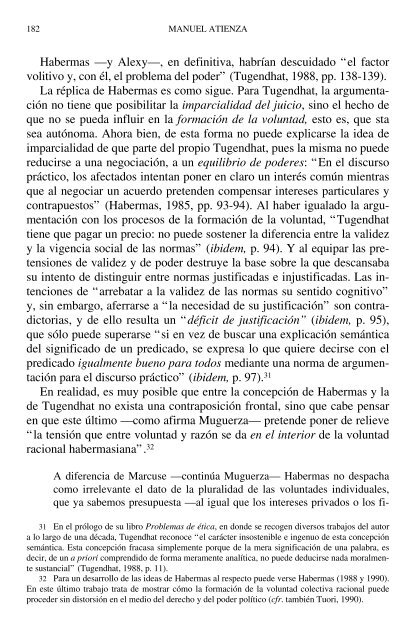LAS RAZONES DEL DERECHO Teo rías de la ar gu men ta ción ju rí di ca
Create successful ePaper yourself
Turn your PDF publications into a flip-book with our unique Google optimized e-Paper software.
182 MANUEL ATIENZA<br />
Habermas —y Alexy—, en <strong>de</strong>finitiva, hab<strong>rí</strong>an <strong>de</strong>scuidado “el factor<br />
volitivo y, con él, el problema <strong>de</strong>l po<strong>de</strong>r” (Tugendhat, 1988, pp. 138-139).<br />
La répli<strong>ca</strong> <strong>de</strong> Habermas es como si<strong>gu</strong>e. P<strong>ar</strong>a Tugendhat, <strong>la</strong> <strong>ar</strong><strong>gu</strong><strong>men</strong><strong>ta</strong><strong>ción</strong><br />
no tiene que posibilit<strong>ar</strong> <strong>la</strong> imp<strong>ar</strong>cialidad <strong>de</strong>l <strong>ju</strong>icio, sino el hecho <strong>de</strong><br />
que no se pueda influir en <strong>la</strong> forma<strong>ción</strong> <strong>de</strong> <strong>la</strong> volun<strong>ta</strong>d, esto es, que s<strong>ta</strong><br />
sea autónoma. Ahora bien, <strong>de</strong> es<strong>ta</strong> forma no pue<strong>de</strong> explic<strong>ar</strong>se <strong>la</strong> i<strong>de</strong>a <strong>de</strong><br />
imp<strong>ar</strong>cialidad <strong>de</strong> que p<strong>ar</strong>te <strong>de</strong>l propio Tugendhat, pues <strong>la</strong> misma no pue<strong>de</strong><br />
reducirse a una negocia<strong>ción</strong>, a un equilibrio <strong>de</strong> po<strong>de</strong>res: “En el <strong>di</strong>scurso<br />
práctico, los afec<strong>ta</strong>dos inten<strong>ta</strong>n poner en c<strong>la</strong>ro un interés común mientras<br />
que al negoci<strong>ar</strong> un acuerdo preten<strong>de</strong>n compens<strong>ar</strong> intereses p<strong>ar</strong>ticu<strong>la</strong>res y<br />
contrapuestos” (Habermas, 1985, pp. 93-94). Al haber i<strong>gu</strong>a<strong>la</strong>do <strong>la</strong> <strong>ar</strong><strong>gu</strong><strong>men</strong><strong>ta</strong><strong>ción</strong><br />
con los procesos <strong>de</strong> <strong>la</strong> forma<strong>ción</strong> <strong>de</strong> <strong>la</strong> volun<strong>ta</strong>d, “Tugendhat<br />
tiene que pag<strong>ar</strong> un precio: no pue<strong>de</strong> sostener <strong>la</strong> <strong>di</strong>ferencia entre <strong>la</strong> vali<strong>de</strong>z<br />
y <strong>la</strong> vigencia social <strong>de</strong> <strong>la</strong>s normas” (ibi<strong>de</strong>m, p. 94). Y al equip<strong>ar</strong> <strong>la</strong>s pretensiones<br />
<strong>de</strong> vali<strong>de</strong>z y <strong>de</strong> po<strong>de</strong>r <strong>de</strong>struye <strong>la</strong> base sobre <strong>la</strong> que <strong>de</strong>s<strong>ca</strong>nsaba<br />
su intento <strong>de</strong> <strong>di</strong>stin<strong>gu</strong>ir entre normas <strong>ju</strong>stifi<strong>ca</strong>das e in<strong>ju</strong>stifi<strong>ca</strong>das. Las intenciones<br />
<strong>de</strong> “<strong>ar</strong>rebat<strong>ar</strong> a <strong>la</strong> vali<strong>de</strong>z <strong>de</strong> <strong>la</strong>s normas su sentido cognitivo”<br />
y, sin emb<strong>ar</strong>go, aferr<strong>ar</strong>se a “<strong>la</strong> necesidad <strong>de</strong> su <strong>ju</strong>stifi<strong>ca</strong><strong>ción</strong>” son contra<strong>di</strong>ctorias,<br />
y <strong>de</strong> ello resul<strong>ta</strong> un “déficit <strong>de</strong> <strong>ju</strong>stifi<strong>ca</strong><strong>ción</strong>” (ibi<strong>de</strong>m, p. 95),<br />
que sólo pue<strong>de</strong> super<strong>ar</strong>se “si en vez <strong>de</strong> busc<strong>ar</strong> una expli<strong>ca</strong><strong>ción</strong> semánti<strong>ca</strong><br />
<strong>de</strong>l signifi<strong>ca</strong>do <strong>de</strong> un pre<strong>di</strong><strong>ca</strong>do, se expresa lo que quiere <strong>de</strong>cirse con el<br />
pre<strong>di</strong><strong>ca</strong>do i<strong>gu</strong>al<strong>men</strong>te bueno p<strong>ar</strong>a todos me<strong>di</strong>ante una norma <strong>de</strong> <strong>ar</strong><strong>gu</strong><strong>men</strong><strong>ta</strong><strong>ción</strong><br />
p<strong>ar</strong>a el <strong>di</strong>scurso práctico” (ibi<strong>de</strong>m, p. 97). 31<br />
En realidad, es muy posible que entre <strong>la</strong> concep<strong>ción</strong> <strong>de</strong> Habermas y <strong>la</strong><br />
<strong>de</strong> Tugendhat no exis<strong>ta</strong> una contraposi<strong>ción</strong> fron<strong>ta</strong>l, sino que <strong>ca</strong>be pens<strong>ar</strong><br />
en que este último —como afirma Mu<strong>gu</strong>erza— preten<strong>de</strong> poner <strong>de</strong> relieve<br />
“<strong>la</strong> tensión que entre volun<strong>ta</strong>d y razón se da en el interior <strong>de</strong> <strong>la</strong> volun<strong>ta</strong>d<br />
racional habermasiana”. 32<br />
A <strong>di</strong>ferencia <strong>de</strong> M<strong>ar</strong>cuse —continúa Mu<strong>gu</strong>erza— Habermas no <strong>de</strong>spacha<br />
como irrelevante el dato <strong>de</strong> <strong>la</strong> pluralidad <strong>de</strong> <strong>la</strong>s volun<strong>ta</strong><strong>de</strong>s in<strong>di</strong>viduales,<br />
que ya sabemos presupues<strong>ta</strong> —al i<strong>gu</strong>al que los intereses privados o los fi-<br />
31 En el prólogo <strong>de</strong> su libro Problemas <strong>de</strong> éti<strong>ca</strong>, en don<strong>de</strong> se recogen <strong>di</strong>versos trabajos <strong>de</strong>l autor<br />
a lo <strong>la</strong>rgo <strong>de</strong> una dé<strong>ca</strong>da, Tugendhat reconoce “el c<strong>ar</strong>ácter insostenible e ingenuo <strong>de</strong> es<strong>ta</strong> concep<strong>ción</strong><br />
semánti<strong>ca</strong>. Es<strong>ta</strong> concep<strong>ción</strong> fra<strong>ca</strong>sa simple<strong>men</strong>te porque <strong>de</strong> <strong>la</strong> mera signifi<strong>ca</strong><strong>ción</strong> <strong>de</strong> una pa<strong>la</strong>bra, es<br />
<strong>de</strong>cir, <strong>de</strong> un a priori compren<strong>di</strong>do <strong>de</strong> forma mera<strong>men</strong>te analíti<strong>ca</strong>, no pue<strong>de</strong> <strong>de</strong>ducirse nada moral<strong>men</strong>te<br />
sus<strong>ta</strong>ncial” (Tugendhat, 1988, p. 11).<br />
32 P<strong>ar</strong>a un <strong>de</strong>s<strong>ar</strong>rollo <strong>de</strong> <strong>la</strong>s i<strong>de</strong>as <strong>de</strong> Habermas al respecto pue<strong>de</strong> verse Habermas (1988 y 1990).<br />
En este último trabajo tra<strong>ta</strong> <strong>de</strong> mostr<strong>ar</strong> cómo <strong>la</strong> forma<strong>ción</strong> <strong>de</strong> <strong>la</strong> volun<strong>ta</strong>d colectiva racional pue<strong>de</strong><br />
proce<strong>de</strong>r sin <strong>di</strong>storsión en el me<strong>di</strong>o <strong>de</strong>l <strong>de</strong>recho y <strong>de</strong>l po<strong>de</strong>r político (cfr. <strong>ta</strong>mbién Tuori, 1990).



